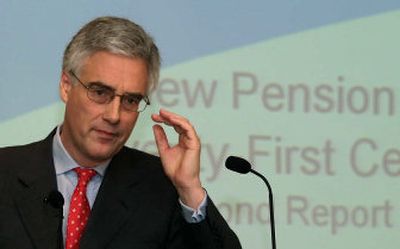Higher retirement age eyed for Britain

LONDON – The British government said Wednesday it will consider raising the retirement age as high as 69 as recommended by a panel commissioned to avert a looming funding crisis in the state pension system as people live longer and have fewer children.
The Pensions Commission, appointed by Prime Minister Tony Blair in 2002, also said the state pension should be increased and proposed creating a National Pension Savings System in which every worker would be enrolled automatically.
“There are significant problems in our pensions system; there is a major demographic challenge,” said Lord Turner, head of the commission.
Work and Pensions Secretary John Hutton agreed reform is needed and said “the broad framework” outlined by the commission would be used as the basis for a public debate in the coming months before the government decides how to proceed.
The commission’s report quickly drew criticism from Britain’s biggest labor confederation, which objected to a higher retirement age, and from a leading industry group, which said matching employer contributions for the proposed savings plan would burden small businesses.
But Hutton said changes have to be made. He noted there will be 50 percent more pensioners by 2050 and said nearly 10 million people of working age are not saving enough for their retirement.
Britain now has a retirement system based on a small state pension paid to everyone who has worked, supplemented by more lucrative private pensions. The state pension has been losing value because it increases in line with prices rather than average pay, while private pensions are being eroded by higher taxes, stock market underperformance and mismanagement.
It is predicted that by 2050, the state pension will have declined from less than 20 percent of average pay to less than 10 percent.
Turner said the state pension, now about $138 a week, should rise in line with earnings rather than inflation. He said that would push government spending on pensions from the current 6.2 percent of gross domestic product to between 7.5 percent and 8 percent in 2050. The rise in pensions will have to be accompanied by an increase in retirement age, he said.
“On the basis of the present life expectancy forecast, we believe that we will need to be in the range of 67 to 69 in 2050 to have an effective state pension system,” Turner said.
Men can now retire at 65 and women at 60, but the women’s retirement age will rise to 65 as of April 2020.
Under the proposed National Pension Savings System, employees would pay a minimum 5 percent of their wages into the program. Tax relief from the government would cover one-fifth of that contribution. Employees would be able to opt out of the system, but the commission said a matching contribution by employers on 60 percent of a worker’s payment would encourage most to stay in. The commission wants the program to begin in 2010.